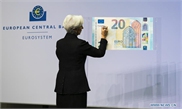ECB meets as virus clouds outlook
Europeans to discuss how to mitigate economic challenges
A resurgence in the coronavirus pandemic and a bumpy start to vaccination drives are likely to weigh on the minds of European Central Bank (ECB) governors when they meet on Thursday, but they are expected to stop short of taking fresh action.
The ECB's 25-member governing council is likely to leave its ultra-loose monetary policy unchanged after injecting more stimulus into the battered eurozone economy in December.
The Frankfurt institution bulked up its pandemic emergency bond-buying program by 500 billion euros ($600 billion) to 1.85 trillion euros and prolonged the scheme until March 2022.
It also announced more ultra-cheap loans for banks.
"Policymakers will be happy to sit out the meeting... and repeat the mantra that they will do whatever is required to support the eurozone through the pandemic," said Andrew Kenningham at Capital Economics.
Their main concern, he said, would be the impact of the pandemic on hopes for an economic rebound in the first quarter of 2021.
Many European governments are reimposing tough restrictions to contain a second wave of COVID-19 cases, compounded by the emergence of new, more contagious strains in Britain and South Africa.
Smaller-than-expected deliveries of the first batches of COVID-19 vaccines, especially in the EU, have further fueled fears that the pandemic could wreak havoc for longer.
The ECB in December forecast economic growth in the 19-nation euro area at 3.9 percent in 2021, after a fall estimated at 7.3 percent in 2020.
ECB chief Christine Lagarde recently said she had "no reasons to believe our forecast is wrong at this point."
But it would become "a concern," she said, if member states had to extend their shutdowns beyond March.
Under Lagarde, the central bank has unleashed unprecedented support to steer the eurozone through the health crisis, while also urging governments to do their bit through fiscal stimulus.
Alongside the emergency bond purchases, the ECB has kept interest rates at record-low levels, and it is still buying 20 billion euros a month in corporate and government debt under a pre-pandemic asset purchasing scheme.
The bond purchases are aimed at keeping borrowing costs low to encourage spending and investment, in a bid to bolster growth and drive up inflation.
The ECB's 25-member governing council is likely to leave its ultra-loose monetary policy unchanged after injecting more stimulus into the battered eurozone economy in December.
The Frankfurt institution bulked up its pandemic emergency bond-buying program by 500 billion euros ($600 billion) to 1.85 trillion euros and prolonged the scheme until March 2022.
It also announced more ultra-cheap loans for banks.
"Policymakers will be happy to sit out the meeting... and repeat the mantra that they will do whatever is required to support the eurozone through the pandemic," said Andrew Kenningham at Capital Economics.
Their main concern, he said, would be the impact of the pandemic on hopes for an economic rebound in the first quarter of 2021.
Many European governments are reimposing tough restrictions to contain a second wave of COVID-19 cases, compounded by the emergence of new, more contagious strains in Britain and South Africa.
Smaller-than-expected deliveries of the first batches of COVID-19 vaccines, especially in the EU, have further fueled fears that the pandemic could wreak havoc for longer.
The ECB in December forecast economic growth in the 19-nation euro area at 3.9 percent in 2021, after a fall estimated at 7.3 percent in 2020.
ECB chief Christine Lagarde recently said she had "no reasons to believe our forecast is wrong at this point."
But it would become "a concern," she said, if member states had to extend their shutdowns beyond March.
Under Lagarde, the central bank has unleashed unprecedented support to steer the eurozone through the health crisis, while also urging governments to do their bit through fiscal stimulus.
Alongside the emergency bond purchases, the ECB has kept interest rates at record-low levels, and it is still buying 20 billion euros a month in corporate and government debt under a pre-pandemic asset purchasing scheme.
The bond purchases are aimed at keeping borrowing costs low to encourage spending and investment, in a bid to bolster growth and drive up inflation.

